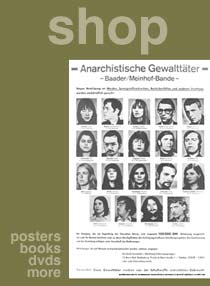Ulrike Meinhof and West German Terrorism: Language, Violence, and Identity
Listen to an interview with Sarah Colvin about Ulrike Meinhof: 45 minutes
In the slim canon of English language books exploring the Red Army Faction and West German terrorism, the number essential works can be counted on one hand, with a few fingers to spare. Sarah Colvin's "Ulrike Meinhof and West German Terrorism: Language, Violence, and Identity joins the list for it's superbly researched and carefully argued analysis of the development of the language employed by Ulrike Meinhof as she progressed from mother and journalist to notorious terrorist.
Colvin takes a reasonable and dispassionate view of Meinhof. Given that Meinhof has been dead for more than three decades, it is refreshing to read an account that leaves aside the typical hagiography and adopts a more rational and factually-based view of the woman and what she became. Perhaps more than any other European woman of the second half of the 20th Century, Meinhof has become a vessel in which people pour their own assumptions and beliefs. Variously Meinhof has become a fashion icon, and feminist martyr, and dedicated warrior, the conscience of the left, and a true revolutionary. Often lost in these analyses is the reality that Meinhof was also a murderer, and a person who had systematically marginalized cops, government officials, industrialists, and others outside of her circle until they were no longer humans and thus no longer worthy of life. Colvin's book is not intended as a corrective to those works that glorify Meinhof without also addressing her violence, but hopefully it may serve that function nonetheless.
Colvin outlines how Meinhof's language changed over time, systematically putting those she disagreed with outside of her "circle of empathy" and therefore ultimately not worth living (The Colvin references "the Circle of Empathy," a term from Jaron Lanier to describe demarcation line individuals place around themselves between those deserving empathy and respect and those that are outside of the circle and therefore less important, less deserving of rights). It is interesting to note in the America of Obama--where some on the right compare Obama and his policies to Hitler and the Nazis--that when Meinhof attacked her government and German business leaders as Nazis, she was talking about actual, real, honest-to-God former Nazis. Yet the comparison was about as appropriate then as it was today. West Germany of the 60s was a progressive society. Yes, it absolutely was populated by former Nazis, and there were clearly troubling elements within the society. But Germany in the 1960s was demonstrably equitable and democratic. Yet if you follow Meinhof's writing through the sixties, you find her tentatively making sideward, non-direct Nazi allusions at first, to more overt comparisons later, to simple assertions of "self-evident fact" by the end of the decade. They simply are Nazis, Meinhof's suggested, and there is no real reason to present any supporting evidence.
Of course Nazis, as the prime villains of the 20th century, were worthy of one thing: extermination. So the head of a manufacturing company, the wife of an American serviceman, a local policeman, and myriad more, became Nazis. And their possible deaths, as evidenced by Meinhof's writing, was something to be celebrated. I am probably a bit biased, considering left-wing German terrorists tried to kill my mom and dad, but when I hear Glenn Beck and Bill O'Reilly--modern journalist/commentators--make specific allusions comparing Obama to Hitler, I can only think of another journalist commentator, working in Germany in the 1960s, making similar comparisons. As Colvin's book so effectively demonstrates, language usage like this tends to dehumanize those that you criticize in your mind and the minds of your followers. At least in the case of Meinhof, this lead to the deaths of dozens, and the paralyzation of a nation. And maybe even the attempted murder of my parents...
If the saga of the Red Army Faction were a Shakespearean drama, Ulrike Meinhof would be Hamlet, a character of epic internal conflict. But I think because Meinhof and her life are so endlessly fascinating, people have neglected to view her in full; to accept her rage, her deadly fervor, and her rapidly shrunken circle of empathy, along with her uniquely fascinating personal narrative. Sarah Colvin's book goes a long way towards helping students of the era to arrive at a more complete understanding of Meinhof.



